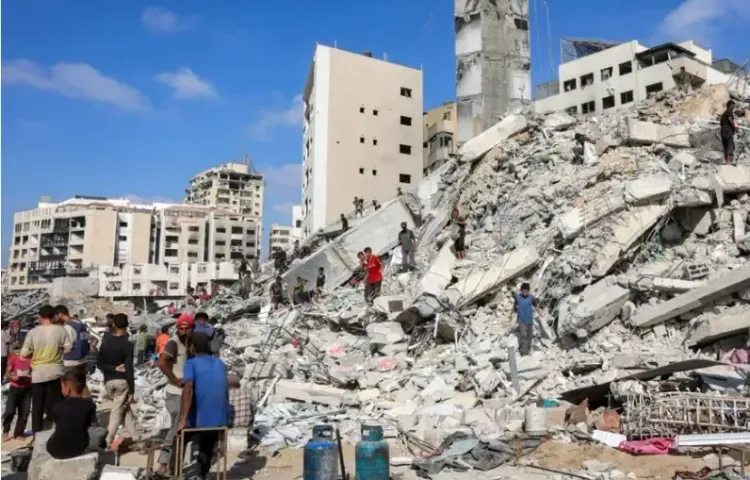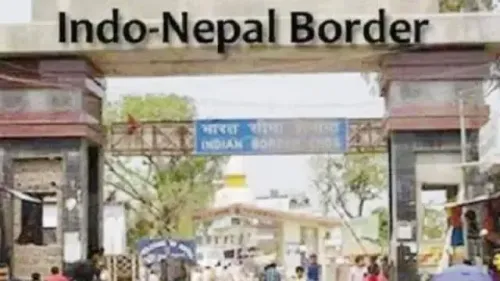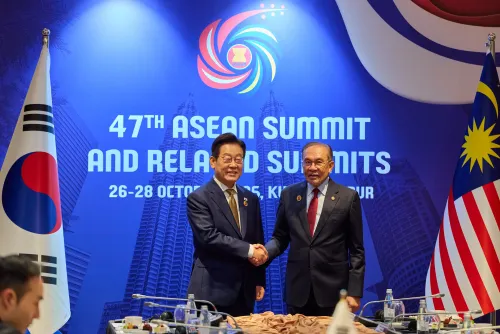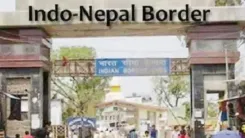Why Are Gaza City Residents Choosing to Stay Amid Israel's New 'Humanitarian Zone'?

Synopsis
Key Takeaways
- Residents are adamant about staying in Gaza City despite military threats.
- Israel's humanitarian zone has been met with skepticism by locals.
- Many fear displacement means loss of dignity.
- Casualties continue to rise amid ongoing military operations.
- Hamas advocates for a ceasefire that involves humanitarian provisions.
Gaza/Doha, Sep 7 (NationPress) Residents of Gaza City are firmly refusing to evacuate, even after Israel declared a new "humanitarian zone" in Khan Younis, located in southern Gaza, as part of its intended operation to seize control of Gaza City.
“They want us to relocate to an area that is already packed with people,” remarked Samer Abu Samra, a 38-year-old father of four, to Xinhua news agency on Saturday.
“We cannot afford transportation or tents. People are worn out and suffering from hunger.”
“I experienced displacement in the south previously, and it was the worst ordeal of my life,” stated Nasser al-Attar, an educator from Gaza City.
“The south isn’t safe either, so staying here isn’t an act of bravery. It’s simply due to the lack of alternatives.”
“We have nothing left to lose but our lives,” expressed Umm Mohammed Jaber.
“Yet, displacement means losing dignity, so we will stay here.”
Om Alaa Abu Ajwa, who is setting up a tent by the Gaza beach, informed Xinhua that life in the south has become “impossible.”
“We chose to return despite the dangers. At least we would die in our city rather than in tents without basic necessities,” she asserted.
“They have tried siege, starvation, and bombardment,” said Abu Luay, 60, outside his partially destroyed home in the al-Shati refugee camp in northern Gaza.
“Their aim is to empty the city, but we believe that staying is the only option left,” he added.
Local activists estimate that approximately 80 percent of Gaza City’s residents have opted to stay.
Earlier on Saturday, the Israel Defense Forces (IDF) announced the newly designated “humanitarian zone,” in a statement “in light of the expansion of the ground operation in Gaza City and the takeover of Hamas strongholds as part of Operation Gideon’s Chariots II.”
The IDF stated that the “humanitarian zone,” which encompasses vital humanitarian infrastructure, will facilitate the ongoing delivery of food, tents, medicines, and medical supplies, according to Xinhua.
In recent weeks, the Israeli military has intensified its operations in Gaza City and other regions of the coastal enclave, asserting that its goal is to dismantle Hamas.
Palestinian sources reported that Israel’s attacks on residential towers have increased recently.
On Friday, Israeli forces demolished the 13-story Mushtaha tower in western Gaza City, claiming it was used by Hamas for intelligence gathering and observation of IDF troop movements.
This assertion was disputed by the tower’s management, who stated that it had been housing displaced civilians since being damaged last year.
On Saturday, Israeli warplanes struck the 15-story al-Sousi tower, also in western Gaza City, reducing it to rubble within minutes and severely damaging nearby homes, shops, and streets.
Mahmoud Basal, spokesperson for Civil Defence in Gaza, told Xinhua, “The bombardment seeks to compel residents to evacuate, transforming entire neighborhoods into desolate areas.”
Hamas characterized the recent Israeli bombardments as part of a “systematic policy of displacement,” expressing its commitment to the 60-day ceasefire proposal put forth by Qatar and Egypt on August 18, and its openness to any ideas or proposals aimed at achieving a lasting ceasefire in Gaza.
Hamas emphasized that any future agreements must entail a complete Israeli withdrawal from Gaza, the unconditional entry of humanitarian aid, and a genuine prisoner exchange deal through serious negotiations mediated by international parties.
Since the 2023 Hamas assault on southern Israel, which resulted in approximately 1,200 fatalities and around 250 hostages, Israel’s offensive in Gaza has led to the deaths of over 64,000 Palestinians and injured 161,000, according to health authorities based in Gaza.
On Saturday, Qatari Prime Minister and Foreign Minister Sheikh Mohammed bin Abdulrahman bin Jassim Al-Thani, in a conversation with British Foreign Secretary Yvette Cooper, urged for heightened regional and international efforts to conclude the devastating conflict in Gaza, ensuring a sustainable and unobstructed flow of humanitarian aid, and securing the release of prisoners and detainees.






